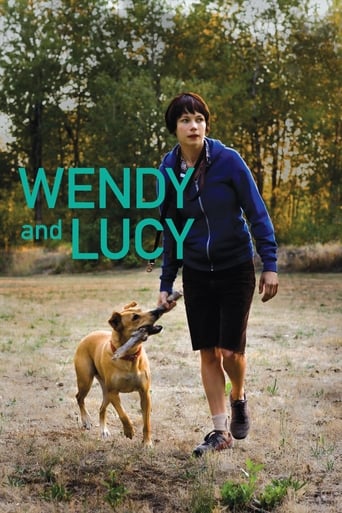sepial
Simplicity, when employed wisely, can serve as an enhancement. Subtlety almost always does. Of all the films I've seen in recent months, including high budget productions and much artistry, this quiet drama with few words, a simple plot and more suggestions than out-spun explanations about the protagonist's background has hypnotised me the most. Everything about this film is just right, every word, however mundane. The carrier is without doubt the lead actress: she's done her job if you feel the person on screen actually has to exist, and you do. Williams is perfectly cast; it's perfect if one is convinced that no other should have played a part. Beside this Wendy's plight might feel awfully familiar to some. Feel, as it is the making that successfully makes the bleak experience of being stranded in a town with a possibly even bleaker past and no real idea about the future tangible. The film is to a large degree an in-between the lines reader. And nothing is added that isn't necessary. Very well done, by anyone involved.
Chris Smith (RockPortReview)
Michelle Williams is an extremely talented actress who flies under the radar of most movie goers. While keeping a quiet public profile she does all of her talking on the big screen. Although she was nominated this year for Best Actress in her portrayal of Marilyn Monroe, Williams gravitates towards small independent films rather than Hollywood blockbusters. My next three reviews will feature Ms. Williams in a few of her best roles. First up is the 2008 film "Wendy and Lucy" directed by Kelly Reichardt.Made on shoestring budget in Oregon this film is an understated character study of a young woman and her dog as they head for better life. Their goal is Alaska and a lucrative job at a fish cannery. The film is minimalist, but high on emotional impact and feeling. Wendy and her companion, a yellow lab mix named Lucy, currently live in their old Honda Accord. After sleeping the night in a Walgreen's parking lot, a kind old security guard must have her move. The car doesn't start and so begins a turning point not only in her trip but her life. She tracks every cent she has in a journal and its getting pretty low. A bad decision at a supermarket and a heartless ass kissing stock boy gets Wendy in trouble with the law. Lucy is left tied to a bike rack outside the market while Wendy is booked for petty theft. A number of hours pass until Wendy is freed and fined $50. She races back to Lucy but she is gone. She finds little help with the indifferent locals and her dilemma only intensified. The one bright spot is the security guard played by Wally Dalton, offering his cell phone and a kind ear.She makes her way to the pound but Lucy isn't there, just a bunch of other lost or abandoned dogs. She has to pay to have her car towed to the repair shop which is only a block away. The mechanic delivers some bad news, the car is dead. Without her car, her sanctuary, she tries spending the night in the woods. It's not long until she is freaked out and nearly attacked by another vagrant. At the end of her rope she calls her estranged sister and gets a big load of nothing. I don't want to throw too many spoilers out there but after some painful choices life must move on.Wendy's struggle unfold like a sort of documentary rather than a film. There is no musical score and the filmmakers are committed to realism. Michelle Williams IS Wendy as she completely commits to this role. Many people agreed as she was nominated for a handful of awards. The movie itself won the AFI's Film of the Year Award. "Wendy and Lucy" is available on Netflix watch instantly.
Raoul Duke
So I watched 2008's indy gem Wendy and Lucy. This movie is the feel good dog movie of the last decade. It is lighthearted, comical, and very easy to watch much like Benji. Wait that's not true in fact this movie is the opposite of that. However, is this movie good, yyyy..yy.yyy.eee.aaa.ssss. Sorry, that's yes I started to cry again. Which unless you are made of stone you will do periodically throughout this movie. It's not a good idea to describe the plot at all (which I am not prone to do anyways), but just to say this movie is very narrowly focused, dealing with the relationship of a homeless girl and her dog. This is a very low budget film, but it doesn't need special effects just demands strong acting from the lead role of Wendy played beautifully by Michelle Williams. This movie sheds a spotlight on several issues including homelessness, the struggles of being gainfully employed in tough times, the loss of someone we love, and the tough decisions we must make sometimes in life. This movie is not for everyone, but if you are an animal lover, an indy lover, or a lover of good and original cinema, get out the tissues and get ready to ball your eyes out you won't be disappointed.
tieman64
"Thirty years ago it would have been widely accepted that objective knowledge about society and history was an asset for a filmmaker. Better film artists adopted a serious attitude toward social life and aesthetics. Today, such an attitude is considered a hindrance. Pastiche, improvisation, surface gloss are highly valued; art is apparently produced by the organisation of clever accidents. This is a temporary state of affairs, but a costly and destructive one. Art, including bad art, has consequences." - David Walsh Cinema has a long history of using tales of youths and their dogs (or other animals, think Loach's "Kes") as an entryway into issues of poverty and social injustice. One of the best of these films is Pereira dos Santos' "Vidas Secas" (also see de Sica's "Umberto D"), one of the defining films of Brazil's cinema novo."Wendy and Lucy", a quietly devastating film by Kelly Reichardt, updates these films and sets them in contemporary America. It opens on Wendy, beautifully played by actress Michelle Williams, and her beloved dog Lucy, as they stroll through Oregon's woodlands. It's a postcard image of a girl and her dog, but one which gets increasingly perverted as the film progresses. And so gradually it becomes clear that Wendy has very little money, lives out of her car, is on her way to Alaska hoping to find employment and that Lucy is the only creature in the world with whom Wendy has a close emotional connection. When Wendy's meagre possessions are taken away from her bit by bit, she increasingly finds herself desperately clutching at straws, not only to survive, but to maintain her sanity. By the end of the film, Wendy's given away everything she has: to possess anything is a burden and debt she cannot maintain.Today in the US, millions hang by their fingernails, and yet you wouldn't know this by the kinds of films routinely churned out, both Hollywood and independent cinema doing as much as they can to ignore contemporary life. Today, over forty five million Americans are living in poverty, over ten million now receive unemployment benefits, the middle class continues to shrink, nationwide bankruptcy has risen above 20 percent and those fortunate to have a job or jobs work long hours for relatively little. Yes, capitalism and its inherent contradictions continue to rumble on - business as usual - but there's also a certain amount of denial at work."We began writing the script after Hurricane Katrina, when the contempt (for those less fortunate) was in the air," Reichardt explains. "if you're poor in America, the perception is that its because you're lazy. As the gap between rich and poor has grown over eight years, so has the feeling that it's okay." So one of the best things about "Wendy and Lucy" is the way its ambiguity practically baits you into chastising Wendy, inducing the kind contempt many have for the homeless and impoverished. Why is Wendy alone? Why is she on the streets? Why doesn't she get a job? (capitalism requires 10-25 percent unemployment) Can't she work? Is she mentally ill? Is she lazy? What exactly is her story? But Reichardt leaves all these questions unanswered. What we do know is that she's in flight because she can't handle or cope with a system which itself refuses to cope with her. Wounded by the world, her sad response is to then exit it. Worse still, despite the meagre acts of kindness thrown her way, society as a whole is structured such that it actively forces Wendys out, like a disease or infection slowly being purged. Meanwhile, the great doctors deny the presence of any illness.Throughout the film, Reichardt practically baits us into damning Wendy based on contemporary conceptions of worth (typically built upon economic productivity). Nevermind that, creepily, her only companion is an animal. No, her disconnection is her fault! Her dollar value is nil, she acts with impracticality and she deserves expulsion. Sever the life lines. She contributes nothing. She is the allowable, acceptable loss of an entire culture. Right? Like her lost car, friends, family and possessions, society has deemed it cheaper and more practical to scrap Wendy – and the whole social segment she represents – rather than repair the damage. This is an unconscious decision by all of society that is as sinister as the most calculated of atrocities.One of the best things the film does is highlight how ineffectual "altruistic" human relations, rules, bureaucracy and regulations are to someone like Wendy. People offer whatever help they can, and yet she falls through the cracks nevertheless. It's a band aid on a waterfall, set up to create not only mass disavowal, but to reinforce the illusion that once again it's the fault of the deprived; "The safety nets were in place, it's her fault she wasn't caught!" Thankfully, "Wendy" isn't an overtly preachy film. Its only allusions to larger issues are a brief shot of "Sometimes a Great Notion", a class conscious novel by Ken Kesey, and the humming of Carnival Of Venice, possibly alluding to the Venetian celebration in which the poor and rich fraternise, but only with masks. And yet in its own low key way, the film taps into a certain American pulse: familial instability, rootlessness, adrift, sub-social young people, a wide and widening social condition, economic desperation, a society that has no room or need for millions, and the inevitable inequality manufactured by capitalism and "surplus value".Final shot: Wendy in a boxcar, creepily humming the same amiable song she hummed at the start of the film. Earlier she has a frightful encounter with a homeless man, a confrontation with her own scary future. Now she has nothing but her body, and it seems like she's about to, suicidally, abandon that too.8.9/10 - Excellent. Williams plays Lucy with powerful subtlety, allowing you to read her silence.

